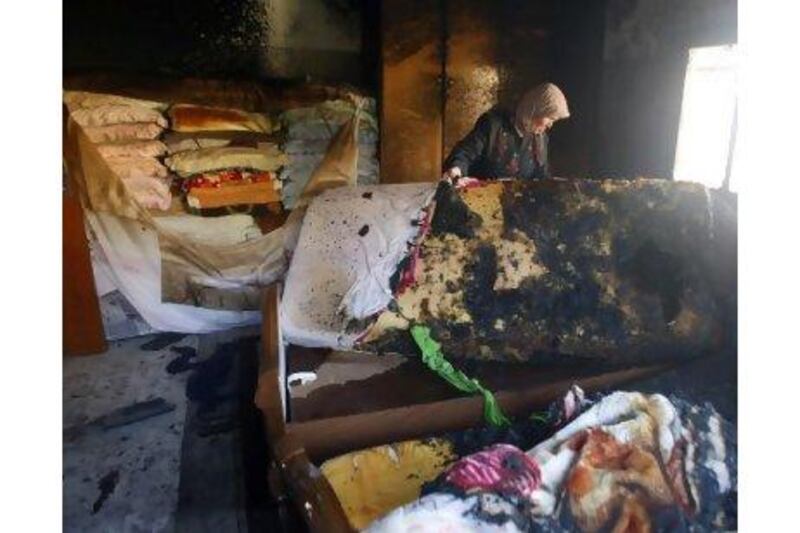JERUSALEM // Jewish settlers infuriated that the Israeli government demolished settlement homes on Monday are planning a day of rage tomorrow.
This comes after some settlers near Hebron lobbed stones yesterday at Palestinian cars and rampaged through the Old City district Monday night, smashing the windows of Palestinian shops.
They also firebombed the Palestinian village of Huwwara near Nablus overnight on Monday. Two children were taken to hospital after inhaling smoke.
The violence comes amid reports that Israel's prime minister, Benjamin Netanyahu, is preparing to legalise several West Bank settlements known as outposts. The Israeli government considers them illegal and they had been slated for demolition.
Israel's defence minister, Ehud Barak, condemned the settler violence yesterday, and blamed "individuals or small groups, whose behaviour is unacceptable".
"I think that these disturbances are harmful to the rule of law and even to the settlement enterprise in the West Bank, which [these protesters] don't represent," he said.
It is unclear if the reported recognition of the outposts is a quid pro quo for settlers halting their attacks. The violence is believed to be in response to clashes on Monday in the settlement of Havat Gilad, one of an estimated 99 outposts that might be made legal.
Settlers armed with knives and rocks clashed with Israeli security forces sent to the community to demolish a tent, a mobile home and the foundations of another structure. The security forces used stun grenades and high-powered paintball guns to push back the settlers, injuring as many as 13.
Israeli police arrested eight setters during the incident.
It is not yet clear what will constitute the day of rage, but local media reports say it could include sit-ins as well as attempts to obstruct roads used by Palestinians.
Mickey Rosenfeld, the Israeli police spokesman, suspected the violence and planned demonstrations were part of a policy by settlers to retaliate against Palestinian communities whenever authorities attempt to dismantle settlement homes. Settlers regularly leave retaliatory marks by vandalising mosques, burning olive orchards and damaging businesses. The vandalism is called "price tagging".
"It seems to be that the incident in Hebron is connected to price-tagging," said Mr Rosenfeld.
Thirty-seven people have been arrested in the West Bank and Jerusalem since the violence erupted on Monday, he said.
In Jerusalem, 23 settlers and their sympathisers were arrested for blocking traffic on major thoroughfares and "obstructing officers while they attempted to get the traffic flowing again".
On Monday Mr Netanyahu reportedly decided to begin legalising some of the so-called outposts.
The Israeli daily Haaretz yesterday reported that Mr Netanyahu agreed to dismantle outposts built on land privately owned by Palestinians, which would affect at least three outposts and about 100 families. On state land, however, outposts would be effectively legalised. That could leave a large number of them intact; the outposts house thousands of settlers.
The Israeli leader is expected to put the proposal to the Israeli High Court before implementation.
Palestinian officials, however, criticised the idea, saying it would violate international law and serve as a pretext for Israel to expand its settlements.
"There is no difference in the extent of the legality between these settlements built on private land or public land, because it's all Palestinian land, whether public or private," said Ghassan Khatib, a spokesman for the Palestinian Authority.
Under the roadmap for Israel-Palestinian peace introduced by the so-called Quartet - the US, the European Union, Russia and the UN - Israel was supposed to have dismantled all outposts built after February 2001.
Yet Sarit Michaeli, a spokesman for B'Tselem, which documents human-rights abuses in Israeli-occupied land, said Israel has done nearly all it could to keep such settlements intact.
"It's absolutely preposterous to suddenly invent this dismantling of a limited number of outposts while seeking to instil legality into the others."
An Israeli official familiar with the issue, who spoke on condition of anonymity, called the Haaretz report inaccurate and said a decision on the matter would be "forthcoming".
* Additional reporting by Agence France-Presse





